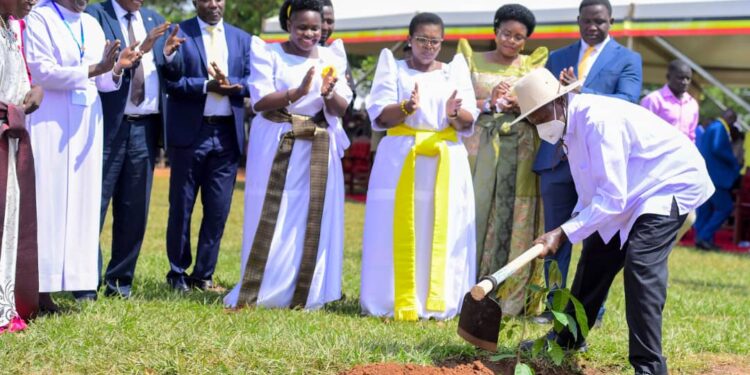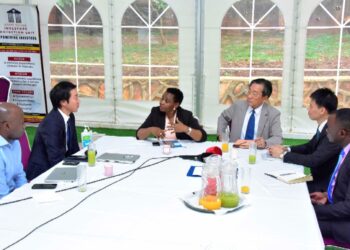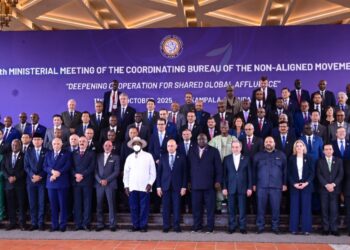President Yoweri Kaguta Museveni has urged Ugandans to embrace reason and science for the proper and sustainable exploitation of natural resources to enhance socio-economic transformation in the country.
“…we do not want a tug of war with citizens over natural resources but we should use reason and science on how to maximise usage of the natural resources we have in the country…”, the president appeals.
The president appealed while addressing a mammoth congregation during the 139th commemoration service for the martyrdom of Saint Gonzaga Gonza held at Bugonza in Kaliro district on Sunday 6th July,2025.
Immediately after the anthems of Uganda, East Africa and Busoga were sung, President Museveni who arrived at 2:07 pm and is known for his hands-on leadership style, took a symbolic step by planting a tree.
This gesture not only underscored his commitment to environmental conservation but also served as a touching reminder that the legacy of St Gonzaga Gonza who was martyred 139 years ago continues to bear fruit.
The President’s act also symbolised the saint’s sacrifice has had a lasting impact nurturing the spiritual lives of millions and inspiring fruitful endeavours that benefit generations to come
With apparent reference to the Biblical account recorded in the Book of Isaiah 1:18, “come now let us reason together”, thus says the Lord. “Though your sins are like scarlet, they shall be as white as snow, though they are red as crimson, they shall be like wool”.
“…We don’t want to have a tug of war with citizens,” Museveni said, urging Ugandans to adopt a collaborative approach in managing natural resources.
While his message was particularly relevant to the misuse of wetlands in Kaliro, the President opted for a broader appeal, emphasising the need to protect all natural resources.
In Philosophy reason refers to the faculty or capacity for rational thought, inference and argumentation. It involves the use of logic, evidence and rational inquiry to arrive at knowledge, understanding or justified beliefs. Reason is often contrasted with other ways of knowing such as intuition, emotion or faith.
The government has been actively working to protect the environment, with agencies such as the National Environment Management Authority (NEMA) and the Rural Development and Conservation Services (RDCS) taking a tough stance against those who encroach and degrade wetlands.
The Ministry of Water and Environment has a fully-fledged and well-facilitated Directorate of Environmental Affairs (DEA)responsible for environmental policy, coordination, regulation, inspection and monitoring of the environment and natural resources as well as the restoration of degraded ecosystems and mitigating and adapting to climate change.
According to the Ministry website, DEA comprises the three departments of Environmental Support Services (DESS), Forestry Sector Support Department (FSSD) and Wetlands Management (WMD). DEA works in collaboration with the National Environmental Management Authority (NEMA) and the National Forestry Authority (NFA) and the Uganda National Meteorological Authority.
The Environmental Protection Police Unit which derives its power from Uganda’s environmental laws and policies plays a crucial role in enforcing laws and ensuring compliance with environmental regulations.
Some key laws and statutes include the National Environment Act Cap 181 enacted in 2019 which provides a comprehensive framework for environmental management in the country, promoting sustainable development and protection of natural resources.
There is also the National Environment Statute,1995 which was enacted on 17th May,1995 and serves as a foundational law for environmental protection in Uganda.
The Uganda Wildlife Act which was enacted in 1996 provides for the sustainable management of wildlife and consolidates the law relating to wildlife management in the country.
Additionally, there is the Water Act, Cap 164 enacted in 1997 and which regulates the use, protection and management of water resources and supply in Uganda.
The National Forestry and Tree Planting Act, Cap 160 enacted in 2003 provides for the conservation, sustainable management and development of forests in the country.
While the National Climate Act, Cap 182 enacted in 2021 at the time the COVID-19 pandemic broke out. This law gives effect to Uganda’s commitments under international climate change agreements and provides for climate change response measures.
Many individuals have lost properties, including buildings, after being evicted from wetlands.
However, President Museveni’s latest appeal suggests a shift in approach, with the President opting for sensitisation and guidance rather than confrontation.
Analysts say by invoking the principles of reason and science, President Museveni who is seeking another term in next year’s polls, appears to be adopting a more paternal approach, befitting his title of “Jaja” (grandfather) among Ugandans.
In many African cultures, grandparents are revered for their wisdom and tolerance. By referring to Ugandans as “bazukulu” (grandchildren), President Museveni is emphasising the need for collective responsibility and cooperation in protecting the environment.
During the address, the president who was dressed in his signature casual attire consisting of a crisp white long sleeved shirt and a pair of rugged jungle army boots, exuding a sense of practicality and down-to earth leadership stressed the need for farmers to get technical guidance from experts and use the wetlands scientifically, with a focus on generating profits through sustainable practices.
“…We want to move away from the old ways of putting in too much labour and getting less return, instead, we need to use science and technology to maximise our gains while protecting the environment…” he said.
This approach is reminiscent of the biblical passage in Isaiah 1:18, where God invites the people to “come and let us reason together.” Despite the people’s terrible sins, God chooses to engage them in dialogue rather than punishment.
Similarly, President Museveni, with all the power to enforce laws and regulations, has chosen to engage with wetland encroachers and users, (‘environment sinners’) seeking a more collaborative approach to environmental conservation.
It is worth observing that Ugandans, like many Africans are known for their strong-willed nature and tendency to challenge authority. This can sometimes manifest as defiance, where warnings or cautionary signs are met with scepticism or outright disobedience.
For example, signs indicating no thoroughfare or warnings against littering or urination in certain areas can be ignored or provoke curiosity about the consequences.
Given this cultural context, it remains to be seen whether the President’s call for embracing reason and science will align with the public and inspire a shift towards a more environmentally conscious behaviour.
He cited the example of the Rev. Dr. Professor Florence Isabirye Muranga, a renowned biochemist and food scientist from Busoga, who has successfully transformed her land in Ankole using scientific farming methods.
According to President Museveni, Professor Muranga’s banana yields are 10 times higher than those of the surrounding community, demonstrating the potential of science-driven agriculture.
To demonstrate the potential of sustainable wetland management, President Museveni directed his State House staff (Hajji Farouk Kirunda the Special Presidential Assistant for Press and Mobilization and Deputy Spokesperson) who was seated next to his tent, to organize a trip for leaders and fish farmers from Kaliro to visit Limoto Parish in Puti-Puti sub-county, Pallisa district.
The area has seen a successful restoration of 70 kilometres of Limoto wetlands, with five fish ponds excavated, each measuring 1,000 square meters. These ponds can rear 6,000 fish each, generating an estimated annual income of not less than UGX 80 million per farmer.
This project has been hailed as a success story and is expected to serve as a demonstration model for nationwide replication.
By sharing this example and promoting a scientific approach to wetland management, President Museveni aims to inspire Ugandans to adopt sustainable practices that balance economic gains with environmental protection.
As the common English saying/proverb goes: ‘we get more vinegar with honey than with gall or ‘you catch more flies with honey than with vinegar’ suggests that a gentle and kind approach is more likely to succeed than a harsh or confrontational one.
Analysts are hopeful that the initiative will inspire a new wave of environmental stewardship, thereby encouraging citizens to take an active role in protecting Uganda’s natural resources.
With the support of the country’s well-established agencies supported by robust laws and policies, the country described as “Gifted by Nature” can work towards a future where economic development and environmental protection go hand in hand in line with the ruling NRM’s slogan of “Securing Your Future”.
Uganda (the Pearl of Africa) is a country endowed with an abundance of natural resources and breathtaking landscapes.
The country’s diverse geography and climate are blessed with rich biodiversity (tropical rainforests, savannas and mountains with varied ecosystems which support a wide range of flora and fauna.
Uganda has abundant water resources like numerous lakes, rivers and wetlands. The country also has ample water resources that support agriculture, fishing and other economic activities.
The fertile soils make Uganda an ideal place for agriculture with crops like coffee, maize, bananas, groundnuts and simsim, cocoa and other cereals.
The scenic landscapes from the Mountains Rwenzori, Elgon, Moroto and Kidepo to River Nile among others provide beauty and majesty.
Do you have a story in your community or an opinion to share with us: Email us at editorial@watchdoguganda.com














